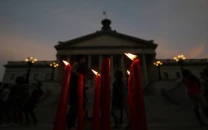Palestinian statehood
The vote clearly demonstrates the number of nations supporting Palestine, contrary to Israeli opinion.

Palestinian statehood
A total of 138 nations, including 12 European nations, voted for the Palestinian resolution. The increased support from Europe is significant; nine countries, led by the US and Israel, voted against the resolution while there were 41 abstentions with three nations not voting at all. The passage of the resolution means the Palestinian Authority’s UN observer status changes from “entity” to “non-member state”. This will also allow Palestine access to the International Criminal Court and some other international bodies.
While the change in status may, in real terms, mean little — as Washington and Tel Aviv have been emphasising — in symbolic terms it is important. The vote clearly demonstrates the number of nations supporting Palestine, contrary to Israeli opinion. The world, with a few exceptions, seems ready to acknowledge this and accept that some lasting solution needs to be found, in order to grant the Palestinians their rights. President Abbas deserves applause for bringing about this change in thinking through numerous talks and by doing so, moving his country closer to regaining a place on the map and becoming a nation whose people deserve the right to determine their own future. The UN decision marks an important point in this long struggle which till now has received far too little support from the rest of the world, mainly as a result of US pressure.
Published in The Express Tribune, December 1st, 2012.


















COMMENTS
Comments are moderated and generally will be posted if they are on-topic and not abusive.
For more information, please see our Comments FAQ